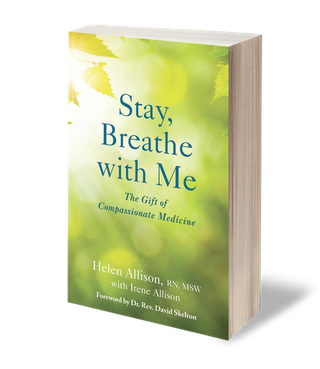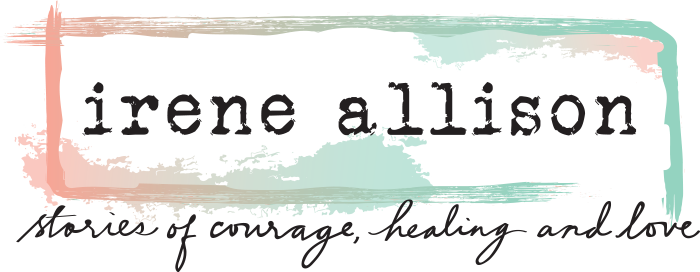by Irene Allison
Too often we underestimate the power of a touch, a smile, a kind word,
a listening ear, an honest compliment, or the smallest act of caring,
all of which have the potential to turn a life around.
– Leo Buscaglia
Our medical system excels at saving lives, fixing body parts, and curing curable disease.
But an aggressive focus on science and technology often blinds it to the person behind the illness and the healing art of care.
This is unfortunate because medical studies prove that compassion has a positive impact on health. Surely it’s time for more heart in health care.
Wish #1
Let’s remember that it’s medicine’s duty to relieve suffering!
The relief of suffering and the cure of disease must be seen as twin obligations of a medical profession that is truly dedicated to the care of the sick.
– Dr. E. J. Cassell
Medicine is both an art and a science. But sadly, the meaning of suffering has been obscured by the science of technology.
The negation of suffering, especially in serious illness, constitutes a failure in healing care. If medicine is capable of extending life, surely it is morally responsible to soothe the suffering of the ill. This should be available for anyone in need of care.
Wish #2
Let’s make hospitals more welcoming!
Hospitals, just like prisons, are closed systems. You are assigned a number, given a gown, and told to obey orders. Noisy, busy, bright lights, strange machinery, codes, and stern-looking staff, is it any wonder our stress increases?
Hospitals save lives and that’s crucial. But for those with chronic or serious disease, hospitals can be scary places. And when stress increases, so does suffering. At the root of the word hospital lies the concept of hospitality. A few small changes would make hospitals feel less stressful. The addition of art, indoor plants, soothing music, welcoming words, smiles, and eye-to- eye contact, are just a few simple things that could help make hospital environments a little more hospitable.
Wish #3
Let’s view patients as people, not as symptoms!
I would rather know what sort of person has a disease than what sort of disease a person has.
– Hippocrates
Medical clinicians know our symptoms, yet rarely do they know our names or anything about us. But serious illness is a drama of body, mind and soul where symptoms and suffering cannot be separated from the person who is ill. We are unique. And the manifestation and meaning of our illness is unique.
Compassionate medicine views the patient not as a disease, not as a set of symptoms, but as an injured storyteller with important information to share.
Wish #4
Let’s welcome the patient’s inner wisdom!
All of us have a doctor within. Our bodies know when things are not right. We don’t always pay attention, but it’s our duty to listen and to share this wisdom with our doctors. Likewise, it’s the duty of doctors to incorporate this wisdom into our care. Because our inner doctor understands how we feel, how symptoms are manifesting, and what causes discomfort, this information reveals clues that are essential for our care.
By incorporating this wisdom, patients can be included as "partners-in- care" on their medical teams.
Wish #5
Let’s listen to the patient!
The lost art of listening and ignoring the patient as a human being is a quintessential failure of our health care.
– Dr. Bernard Lown, world-renowned cardiologist and Nobel Prize winner
All of us long to be heard and understood. Especially when we’re ill. When this happens, something inside us is deeply soothed. And that is very healing. Whole-person, compassionate care starts when clinicians listen to their patients.
It’s time to start listening.
Wish #6
Let’s include community!
All of us have a need to belong. By sharing with open hearts and deep ears to the life and wounds of one another, we increase our sense of healing connection. By entering into that space of shared humanity and universal human needs, suffering can be eased. Through the art of care and in collaboration between patients, families, doctors and caregivers, we can make things better.
Not one of us is an island. Illness is a family and community affair.
Wish #7
Let’s accept that we’re all human (you too, doctor)!
Because our society focuses on success and perfection, illness often leaves us feeling ashamed. Likewise, doctors who can’t cure may feel inadequate. But shame in any form only separates us from one another and increases suffering.
Instead, if we openly embrace all aspects of the human journey, including fear, vulnerability, disease, and death, we can honor what we have in common rather than what keeps us apart. When we remove the false barriers that separate clinicians and patients we reduce suffering. After all, we’re all human and we’re all in this together.
Wish #8
Let’s be caring right to the end!
Medicine can’t “cure” mortality, but it can ease our way for a gentle passing.
When cure is no longer possible, medical expertise in the management of pain combined with tender, non-intrusive palliation provides a humanitarian approach to ease suffering.
Just as we need help coming into life, we need help at life’s end.
Wish #9
Let’s celebrate life (including the messy bits)!
If life is a journey, so too is illness, and the two are intertwined. So let’s hold them with compassion, from start to finish, through all the messy, sad, and joyful moments.
If we are willing to embrace the human side of illness, we can make things better as we journey this road together.
Wish #10
Let’s put patients first!
Every person who is ill should receive the care they need. If we put patients first, we can bring comfort through the art of care. So let’s:
- use medical skill and knowledge to ease patient suffering
- see patients as people, not as symptoms
- listen to the wisdom of the patient and include them in the caregiving team
- remove false barriers between caregivers and patients in an exchange of shared humanity
- honor the right of patients to receive or refuse treatment
- accept that we are all human in this finite life
- be gentle and care for one another
Technology reigns supreme in our modern lives, but we must never forget the healing power of compassion and human connection. Especially when it’s combined with good medicine.
* * *

Irene Allison is co-author of Stay, Breathe with Me: The Gift of Compassionate Medicine, written together with her mother, Helen Allison, a pioneer in palliative care. Irene, a former technical author and teacher, lives with her husband on a west coast Canadian island where she just can’t seem to stop writing. Visit Irene at: http://www.ireneallison.com or on Facebook at: https://www.facebook.com/ireneallisonauthor/

